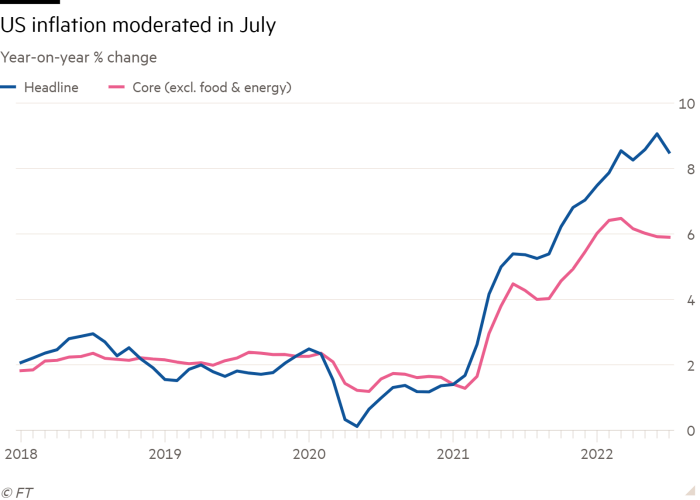The US consumer price index rose by 8.5 per cent year-on-year in July, a slower annual increase compared to June, as inflationary pressures eased on the back of lower petrol prices.
CPI data released on Wednesday showed no increase between June and July, compared to a 1.3 per cent monthly increase recorded a month ago. On an annual basis, the CPI decelerated from a 9.1 per cent increase in June.
Both figures were improvements over economists’ expectations of a 0.2 per cent increase in the CPI on a monthly basis and an 8.7 per cent rise annually — but mean inflation is still close to 40 year highs.
The data are unlikely to represent a large enough shift to stop the Federal Reserve from ploughing ahead with more aggressive tightening of monetary policy to subdue inflation.
The core measure of CPI — which strips away more volatile food and energy prices and is most closely watched by the Fed — recorded a smaller monthly increase of 0.3 per cent compared with 0.7 per cent in June. But on an annual basis it rose at an unchanged pace of 5.9 per cent.

Wall Street stock futures jumped following the inflation reading, with contracts tracking the broad S&P 500 index rising 1.6 per cent. Those tracking the Nasdaq 100 gauge, which comprises tech shares that are more sensitive to changes in interest rate expectations, added 2.2 per cent.
US government bonds also rallied, with the yield on the 10-year Treasury note — a proxy for borrowing costs worldwide — falling 0.1 percentage points to just under 2.7 per cent. The policy-sensitive two-year yield slid 0.19 percentage points to 3.1 per cent, reflecting a sharp rise in the price of the instrument.
Traders began pricing in smaller interest rate increases from the Fed in the coming months. Prior to the report, the futures market expected the central bank to lift rates to 3.6 per cent by year-end. Expectations are now at 3.4 per cent. Bets that the Fed would raise rates by 0.75 percentage points at its September policy meeting also fell.
The inflation data were released following a strong jobs report on Friday last week that stamped out fears of a near-term recession but suggested the Fed was struggling to cool down the overheated economy.
It comes as the administration of President Joe Biden and congressional Democrats have been celebrating the passage through the Senate of a $700bn climate, tax and healthcare bill that represents a crucial pillar of the president’s economic agenda.
While they have dubbed it the Inflation Reduction Act, the bill is not expected to have a significant effect on prices in the short term. However, certain measures are designed to reduce costs over the medium and long term, including a provision allowing the government to negotiate prescription drug prices.
Additional reporting by Harriet Clarfelt in London
